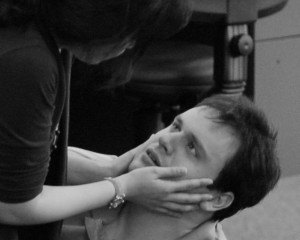 “That is the terrible hour where my poor mind awakes from the short anesthesia induced by manual labor.” (Gomatz, in Zaide)
“That is the terrible hour where my poor mind awakes from the short anesthesia induced by manual labor.” (Gomatz, in Zaide)
As I’ve learned in these few weeks of studying and preparing Zaide, punishment was once primarily corporal – of the body. Then it became temporal – separating offenders from the rest of the world for longer periods of time depending on the severity of the crime. Then punishment expanded into the psychological. Our hero Gomatz, as quoted above, feels such desperation that he craves physical punishment in order to silence the terror in his mind.
We’ve just added a “mature content advisory” to our description of Zaide. It was a complicated decision, for in comparison to the violent images in much of our culture – both in entertainment and in hard news – our performances are not extreme. But some people come to the opera expected all-gentility-all-the-time, and there are moments in Zaide that are designed to make us uncomfortable.
Art has the ability to comfort, and it’s this attribute that speaks to us most potently. We turn to music often in our hours of need for solace, calm, and perspective, and that is certainly not wrong. But we shouldn’t forget that art amplifies and intensifies every aspect of our human experience, and sometimes that means that it opens our eyes to things that challenge us.
There’s a love story at the heart of this opera. Actually, a few different kinds of love stories. And the urgency of the deep connections that these characters make to one another can only be understood if we have context. In this case, that context includes the harsh and sometimes brutal reality of the captivity that is these characters’ lives. It includes punishment in all its guises, and these performances of Zaide struggle to help us understand how difficult yet essential it is that human affection thrive in such an environment. Only when we travel with Zaide, Gomatz and Allazim to the soul-crushing reality of their lives do we realize the power and potency of the beauty in the depths of their souls.
We know that Mozart yearned to write a serious German opera at the time he was working on Zaide. Perhaps one of the reasons he abandoned it is that the new German Singspiel theater aesthetic was tooled for comedy, and the ways in which he’d have to adjust and finish this opera were at odds with the reason he started it. We’ll never know. But we’ve chosen to take it at face value and create a theatrical environment that is cold, frightening, and confusing. So that when the music soars, it takes our breath away to be reminded that beauty can prevail in such a place.
Add Comment